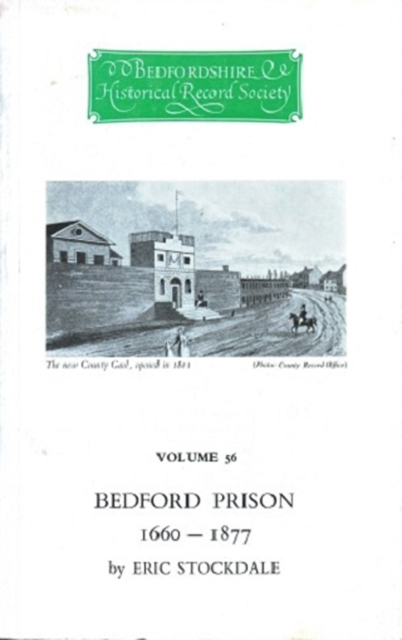Book contents
- Frontmatter
- Contents
- Acknowledgments
- Foreword
- Introduction
- Chapter 1 John Bunyan 1660-1688
- Chapter 2 Some Contemporaries of Bunyan
- Chapter 3 The Richardson-Howard Family of Jailers 1711-1814
- Chapter 4 Transportation to America Before 1776
- Chapter 5 John Howard 1773-1790
- Chapter 6 Samuel Whitbread 1790-1815
- Chapter 7 Philip Hunt 1815-1835
- Chapter 8 Philip Hunt 1815-1835
- Chapter 9 Lord John Russell In Office 1835-1841
- Chapter 10 The Rebuilding of The Jail 1839-1849
- Chapter 11 The Unsettled Years 1849-1853
- Chapter 12 The Final Years Before Nationalisation 1853-1877
- Conclusion
- Note On References and Spelling
- Appendix 1 Bedford in 1765
- Appendix 2 Jailers of Bedford 1710-1885
- Appendix 3 The Richardson-Howard Family
- Appendix 4 Site Plan of Bunyan’s Jail
- Appendix 5 Deed of Appointment of Jailers 1740
- Appendix 6 The Whitbread-Howard Link
- Appendix 7 Lord John Russell’s Family
- Appendix 8 Bedford in 1841
- Appendix 9 The Jail in 1849
- Index of Names
- Subject Index
- Bedfordshire Historical Record Society
- Miscellaneous Endmatter
Chapter 9 - Lord John Russell In Office 1835-1841
Published online by Cambridge University Press: 03 August 2023
- Frontmatter
- Contents
- Acknowledgments
- Foreword
- Introduction
- Chapter 1 John Bunyan 1660-1688
- Chapter 2 Some Contemporaries of Bunyan
- Chapter 3 The Richardson-Howard Family of Jailers 1711-1814
- Chapter 4 Transportation to America Before 1776
- Chapter 5 John Howard 1773-1790
- Chapter 6 Samuel Whitbread 1790-1815
- Chapter 7 Philip Hunt 1815-1835
- Chapter 8 Philip Hunt 1815-1835
- Chapter 9 Lord John Russell In Office 1835-1841
- Chapter 10 The Rebuilding of The Jail 1839-1849
- Chapter 11 The Unsettled Years 1849-1853
- Chapter 12 The Final Years Before Nationalisation 1853-1877
- Conclusion
- Note On References and Spelling
- Appendix 1 Bedford in 1765
- Appendix 2 Jailers of Bedford 1710-1885
- Appendix 3 The Richardson-Howard Family
- Appendix 4 Site Plan of Bunyan’s Jail
- Appendix 5 Deed of Appointment of Jailers 1740
- Appendix 6 The Whitbread-Howard Link
- Appendix 7 Lord John Russell’s Family
- Appendix 8 Bedford in 1841
- Appendix 9 The Jail in 1849
- Index of Names
- Subject Index
- Bedfordshire Historical Record Society
- Miscellaneous Endmatter
Summary
The Act of 1835 and the Inspectors
The time which Lord John Russell spent as Home Secretary, 1835-39, constituted the most crucial four year period in the history of the prison system. In those years the decisions were taken which led to the construction of the prisons which today still partly determine our penal policies by their mere presence. Russell’s background fitted him admirably for the job of a reformer at the Home Office, and he was well aware of this. Tn all times of popular movement the Russells have been on the “forward” side’, he wrote to his brother Francis, by then 7th Duke of Bedford, on 13 October 1841, ‘At the Reformation the first Earl of Bedford, in Charles the First’s days Francis, the great Earl, in Charles the Second’s William Lord Russell, in later times Francis Duke of Bedford— my father—you—and lastly myself in the Reform Bill’. His friend Sydney Smith had the following to say about Russell’s confidence: ‘I believe Lord John Russell would perform the operation for the stone, build St. Peter’s, or assume—with or without ten minutes’ notice—the command of the Channel fleet; and no one would discover by his manner that the patient had died, the church had tumbled down, and the Channel fleet been knocked to atoms’.
Russell himself wrote very little about his days as Home Secretary when he was responsible for some of the prison problems of the day and, perhaps for this reason, his biographers have not paid much attention to his connection with the prisons either. However limited his knowledge of prison matters may have been, Russell was aware of many of the problems of crime and criminals on his appointment: he had been a Member of Parliament and a Minister, and he had chaired a Select Committee on the subject in 1827—the one to which Philip Hunt had given extensive evidence. Apart from this Russell was a shrewd observer who managed to keep a balance between town and country interests. In his autobiographical work he mentioned the problem of poverty and the early inadequate relief provisions.
- Type
- Chapter
- Information
- Bedford Prison 1660-1877 , pp. 140 - 160Publisher: Boydell & BrewerFirst published in: 2023

